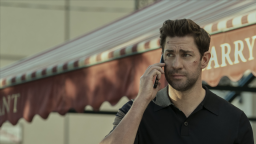Save articles for later
Add articles to your saved list and come back to them any time.
Britain in 1956 must have been a paradise, at least according to the characters in the new BBC drama series Ten Pound Poms (screening here on Stan*). The hapless migrants are constantly shocked by the life they are forced to endure in this primitive country called Australia.
They point in horror at the outside toilets, as if all of Britain was fully flushed by 1956. They are agog at the racism, as if the Britain of the time was free of any taint of prejudice. And they are appalled by the sexism of the Australian men for, surely, that too was never experienced in Britain.
A series about the ‘struggle’ of British migrants? Ten Pound Poms feels more like fantasy than fact.
I’m a great fan of the British – their newspapers, their television, their literary culture. But they do have a tiny blind spot when it comes to Australia.
Remember Sylvania Waters? It pandered to every British preconception about the Aussies, presenting a family whose members are variously materialistic, argumentative, uncultured, heavy-drinking and acquisitive. The ABC co-produced and screened it (just as this new show is co-produced by Stan), but it was largely made by the Brits.
Further back, there was D.H. Lawrence’s Kangaroo, in which Australians “appear like phantoms, and disappear in the same instant, like phantoms. Like so many Flying Dutchmen, the Australian’s acquaintances seemed to steer slap through his consciousness, and were gone on the wind.”
This time around, English writer Danny Brocklehurst asks us to have some sympathy for the 1.2 million Brits who came to Australia under the assisted migration program. As he’s told the British press, “Australia was advertised as sunny and optimistic, but when the Ten Pound Poms got there they were treated as second-class citizens.”
To prove the point, the main character is rapidly given employment with a violent psychopath who’ll not let him use the toilet, since it’s for “Australians only”.
The dialogue follows: “You have blacks in Britain, don’t you? Well over here, you’re the black.”
He then tells the Englishman that he has a poor chance of fitting in. He does so by employing that typical Australian phrase, “You’d have as much chance of spotting a one-legged wallaby peeing on a Kiwi’s grave.”
No, really. This is the actual dialogue.
They then kill an Aboriginal boy in a hit-and-run car accident, before agreeing no one should be told.
There are spiders everywhere, of course, and spooky music plays whenever we’re shown the landscape. No wonder: a signpost showing we’re 56 miles from Sydney is set against a background of red dirt and desert vegetation.
Oh, and there are several discussions about the war, in which, it seems, only British people fought. So that’s good to know.
None of this is to say there were no challenges for the real-life Ten Pound Poms, but I doubt they’d be surprised by an outside toilet. And, while many would have been taunted as newcomers, it’s hard to believe they faced anything like the hostility that greeted other post-war migrants, especially those who didn’t have English.
The Ten Pound Poms were, after all, joining a society which was ethnically dominated by the British, and considered itself British. In the 1966 census, for instance, there was a listing for those born in Australia – 81.6 per cent of the population – then a figure for “Born in Britain”. These two numbers were then added together to give the figure for “Total British: 11,039,387”.
Those from Asia, the Americas, Africa and India – in fact, from anywhere outside the 10 European countries considered worthy of separate listing – were recorded as “other”. In the 1966 census, they number fewer than 100,000.
Britain was still commonly referred to as “home”, even by those born in Australia. In 1954, just two years before Ten Pound Poms is set, much of the country turned out to greet Queen Elizabeth on her first tour. In Sydney, about a million people showed up – equal to more than half the city’s population. Nine years later, Robert Menzies, the prime minister of the time, was still full of admiration: “I did but see her passing by, and yet I’ll love her till I die.”
It’s impossible, of course, to summarise the experiences of more than a million people. Some, I’m sure, would have had a violent psychopath for a boss. And it’s conceivable that an individual migrant might have found themselves an accomplice to a criminal act involving the death of an Indigenous child. The word “Pom” was sometimes used kindly, but often not.
Yet here’s one certain thing: 75 per cent of the Ten Pound Poms stayed after their two-year stint was over. And of the 25 per cent who went home, about half then returned – the so-called “Boomerang Poms”. In other words, most people found a far better life here than in Britain. Even despite the spiders.
Ten Pound Poms is well-made and juicy with plot. Australian actor David Field gives a mesmerising performance as the psychopath employer, even if his script sometimes leans a little heavily on the film Wake in Fright.
But, just like Sylvania Waters, Ten Pound Poms may owe more to smug British stereotypes about their cousins Down Under than to the real story of those who came and, mostly, prospered.
*Stan is owned by Nine, the owner of this masthead
Find out the next TV, streaming series and movies to add to your must-sees. Get The Watchlist delivered every Thursday.
Most Viewed in Culture
From our partners
Source: Read Full Article



